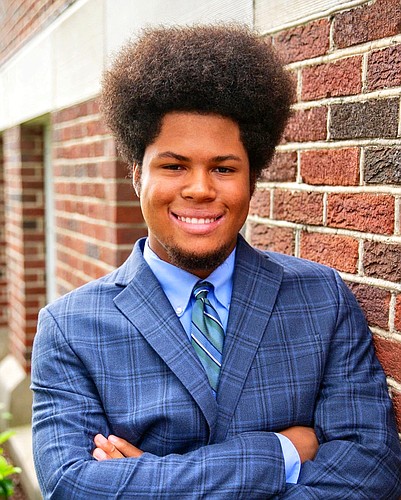- April 26, 2024
-
-
Loading

Loading

Eighteen-year-old Sean Lewis has myriad accomplishments. He currently is attending Yale University. He was a National Merit Scholarship finalist and a National African American Recognition Program winner. He received the Ron Brown Scholarship and was a semifinalist in the Princeton Classic Speech and Debate competition.
Now, the Ocoee resident can add yet another achievement to his list — finalist in the Breakthrough Junior Challenge competition.
Lewis is one of only 16 finalists selected out of thousands of applicants worldwide.
The annual challenge asks students to inspire creative thinking about science through the making of an original short video that brings to life a concept or theory in life sciences, physics or mathematics.
Lewis, who learned about the competition from his mom, said the competition combines two of his favorite passions — science and videography.
“I was really excited,” he said of being named a finalist. “It shows how much I’ve improved in terms of video-making, and, also it was great to know I’m on track to possibly win the competition. It’s amazing to see people appreciating the video I made and the way I talk about science.”
SILICON-BASED LIFE
Lewis’ video explores whether life on other planets may be made of something other than carbon and considers the possibility of silicon-based life.
Silicon-based life is a theory proposed by popular shows including “Star Trek.”
“If you have carbon-based life, and silicon is the molecule that’s the most similar to it, is it possible for life to be made out of silicon?” Lewis asks.
Lewis conducted research on the concept for his AP Research class at West Orange High School and was able to take a deep dive into the topic and its history.
“It’s a very small topic that not a lot of people know about,” he said. “I thought it would be nice to be able to share that topic with more people, because the more research that’s done in that area, the more we can possibly learn and expand the ideas of the concept. If silicon-based life is possible — and is possible on other planets — it might expand our definition of life and the search for life on other planets, thus being able to improve our search for habitable planets in our universe.”
As a finalist, Lewis now will go through panel judging.
The winner of the competition will receive a $250,000 post-secondary scholarship, a $50,000 prize for a selected teacher and $100,000 for a science lab at his past high school.
Lewis said he selected his physics teacher, Tyler Hedrick, who has been an inspiration for him.
“Mr. Hedrick has always been a great, funny, interesting guy in terms of being able to make physics fun even with the limited resources of being in a public school with so many kids and so many classes,” Lewis said. “He was still able to work to make engaging labs and intriguing lessons. If you’re willing to work with him, he will work with you.”
Lewis was even Hedrick for senior flip day at the school during which seniors took over as teachers for one day. Lewis completed a presentation on deriving the equations for the size of a black hole.
Lewis said he is passionate about science — and, particularly, physics, because it’s one of the only “end-all-be-all” fields.
“It’s cool even on the basic level to be able to calculate things like the trajectory of a ball and know exactly where it’s going to land at an exact time,” he said. “Being able to understand the intricacies of the molecules that make us who we are and being able to understand what’s happening millions of miles away, and it all works together in every single way. Through science, you’re able to uncover the mysteries of what we don’t know while also being able to understand everything about the world and what we do know. It allows you to really contribute to something that has so much left to be discovered.”
FUTURE PLANS
If he wins, Lewis will use the scholarship prize money to continue his work in furthering his education at Yale University, where he studies astrophysics. He eventually hopes to attend graduate school.
His dream job is high-energy astrophysics — working with black holes and neutron star systems.
As far as the lab for WOHS, he has high hopes.
“Being able to have the students and teachers have access to something that puts them on par with private schools in the area that cost like thousands of dollars to go to and have such high tuition … being able to have that work in a public school and also to make the job easier for teachers like Mr. Hedrick and the rest of the creative teachers at the school,” Lewis said.
The winner for the competition will be announced in November.